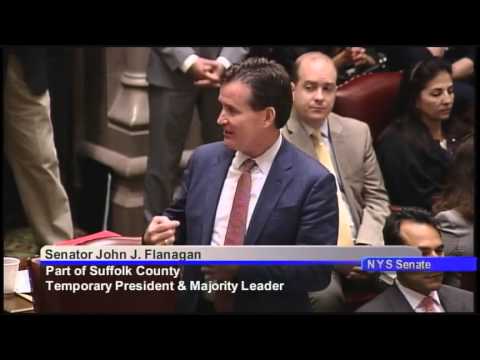
Senator Flanagan Announces Passage Of Legislation To Assist Family Caregivers
John J. Flanagan
May 1, 2015
-
ISSUE:
- Health
Senator John Flanagan (2nd Senate District) announced that the New York State Senate has approved legislation that would help caregivers receive the necessary resources to deliver care to older adults and others with long term health needs in a home setting. The CARE Act (S676A) would reduce future hospitalizations of patients by ensuring that caregivers are involved in and educated about patients’ needs and how to best meet them once they leave the hospital.
At any given time, an estimated 4.1 million New Yorkers provide varying degrees of unreimbursed care to adults with limitations in daily activities. While most caregivers are asked to assist an individual with basic activities of daily living such as mobility, eating, and dressing, many are expected to perform complex tasks on a daily basis such as administering multiple medications, providing wound care, and operating medical equipment.
Despite the vast importance of caregivers in the individual's day-to-day care, many caregivers find that they are often left out of discussions involving a patient's care while in the hospital, and upon the patient's discharge, receive little to no instruction in the tasks they are expected to perform.
The Caregiver Advise, Record, and Enable (CARE) Act passed today would help address these challenges by having caregivers and hospitals work together in the development of a care plan. Upon admission to a hospital, a patient would be able to designate a caregiver in the patient's medical record. Prior to the patient's discharge to their residence or transfer to another facility, the hospital would need to notify and offer to meet with the designated caregiver to discuss the patient's plan of care and offer to adequately train the designated caregiver in certain aftercare tasks.
This approach would not only improve the quality of care provided to patients once they leave a hospital setting, but it would help reduce an estimated $17 billion in Medicare funds spent nationally each year on hospital readmissions that would not be needed if patients had received the proper care.
“By empowering someone close to the patient to properly care for their loved one, this legislation will help ensure a smooth and comfortable transition. It will help provide outgoing patients with a higher level of care and reduce the possibility that discharged patients will have to return for another costly hospital stay. And most importantly, it will allow all involved to be allowed to deal with a very personal situation with dignity and support,” stated Senator Flanagan.
“By identifying a caregiver while the patient is still in the hospital, involving the caregiver in the discharge plan and providing personalized instruction on post discharge care, this legislation will make a real difference in patient care and health outcomes. This legislation embodies the triple aim of health care -- improving health, enhancing quality, and reducing cost,” added Senator Kemp Hannon (6th Senate District), the Chairman of the Senate Health Committee.
“The better prepared family caregivers are when they take their loved ones home from the hospital, the smoother the transition will be for both patient and caregiver and the better the health outcome,” Beth Finkel, State Director for AARP in New York.
In addition to this measure, the Senate recently passed a state budget that includes significant funding increases that support resources for long term care patients and caregivers. An additional $25 million will support Alzheimer’s programs in 2015-16, and an increase of more than $8 million will go to the New York Connects program for a statewide expansion that will give more patients access to long term care options, services, and support. The budget also increased funding for the Community Services for the Elderly Program by $2.5 million and included an additional $500,000 for the Long Term Care Ombudsman Program.
The bill has been sent to the Assembly for further action.
Share this Article or Press Release
Newsroom
Go to Newsroom
News12 Segment on Extension of Property Tax Cap
June 24, 2015


